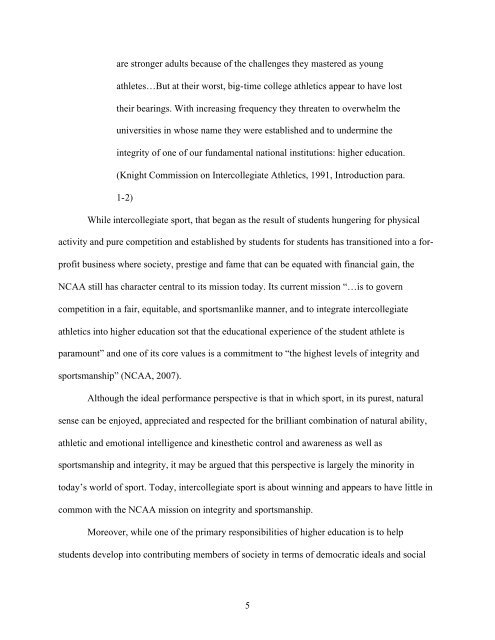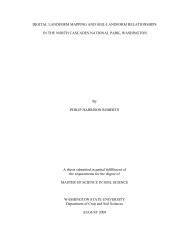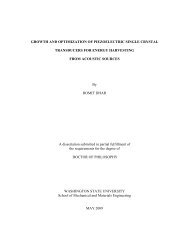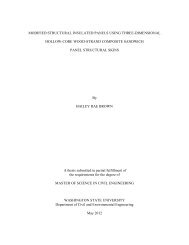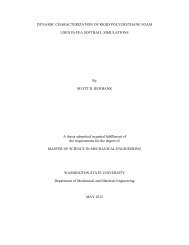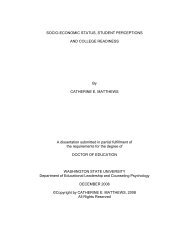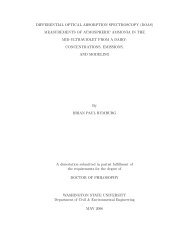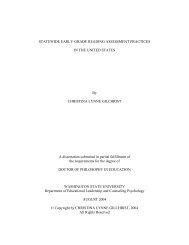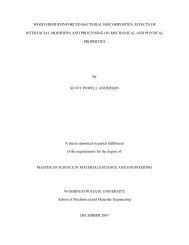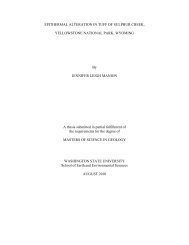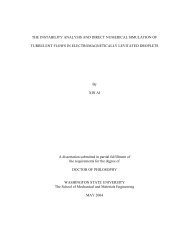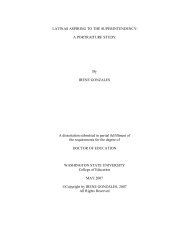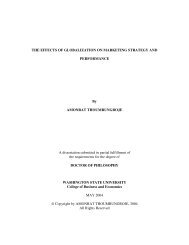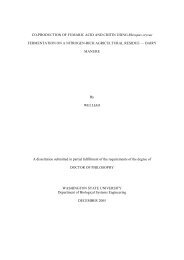the moral reasoning of student athletes and athletic training students
the moral reasoning of student athletes and athletic training students
the moral reasoning of student athletes and athletic training students
You also want an ePaper? Increase the reach of your titles
YUMPU automatically turns print PDFs into web optimized ePapers that Google loves.
are stronger adults because <strong>of</strong> <strong>the</strong> challenges <strong>the</strong>y mastered as young<br />
<strong>athletes</strong>…But at <strong>the</strong>ir worst, big-time college <strong>athletic</strong>s appear to have lost<br />
<strong>the</strong>ir bearings. With increasing frequency <strong>the</strong>y threaten to overwhelm <strong>the</strong><br />
universities in whose name <strong>the</strong>y were established <strong>and</strong> to undermine <strong>the</strong><br />
integrity <strong>of</strong> one <strong>of</strong> our fundamental national institutions: higher education.<br />
(Knight Commission on Intercollegiate Athletics, 1991, Introduction para.<br />
1-2)<br />
While intercollegiate sport, that began as <strong>the</strong> result <strong>of</strong> <strong>student</strong>s hungering for physical<br />
activity <strong>and</strong> pure competition <strong>and</strong> established by <strong>student</strong>s for <strong>student</strong>s has transitioned into a forpr<strong>of</strong>it<br />
business where society, prestige <strong>and</strong> fame that can be equated with financial gain, <strong>the</strong><br />
NCAA still has character central to its mission today. Its current mission “…is to govern<br />
competition in a fair, equitable, <strong>and</strong> sportsmanlike manner, <strong>and</strong> to integrate intercollegiate<br />
<strong>athletic</strong>s into higher education sot that <strong>the</strong> educational experience <strong>of</strong> <strong>the</strong> <strong>student</strong> athlete is<br />
paramount” <strong>and</strong> one <strong>of</strong> its core values is a commitment to “<strong>the</strong> highest levels <strong>of</strong> integrity <strong>and</strong><br />
sportsmanship” (NCAA, 2007).<br />
Although <strong>the</strong> ideal performance perspective is that in which sport, in its purest, natural<br />
sense can be enjoyed, appreciated <strong>and</strong> respected for <strong>the</strong> brilliant combination <strong>of</strong> natural ability,<br />
<strong>athletic</strong> <strong>and</strong> emotional intelligence <strong>and</strong> kines<strong>the</strong>tic control <strong>and</strong> awareness as well as<br />
sportsmanship <strong>and</strong> integrity, it may be argued that this perspective is largely <strong>the</strong> minority in<br />
today’s world <strong>of</strong> sport. Today, intercollegiate sport is about winning <strong>and</strong> appears to have little in<br />
common with <strong>the</strong> NCAA mission on integrity <strong>and</strong> sportsmanship.<br />
Moreover, while one <strong>of</strong> <strong>the</strong> primary responsibilities <strong>of</strong> higher education is to help<br />
<strong>student</strong>s develop into contributing members <strong>of</strong> society in terms <strong>of</strong> democratic ideals <strong>and</strong> social<br />
5


